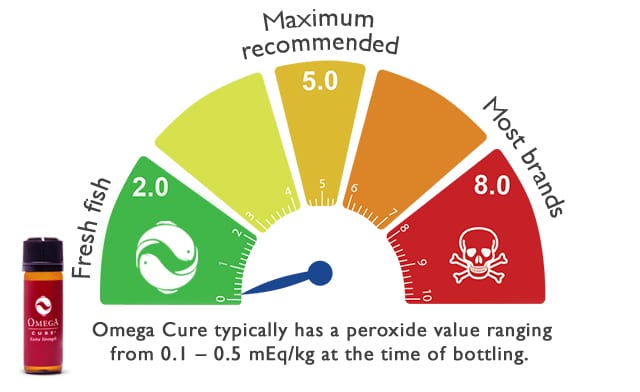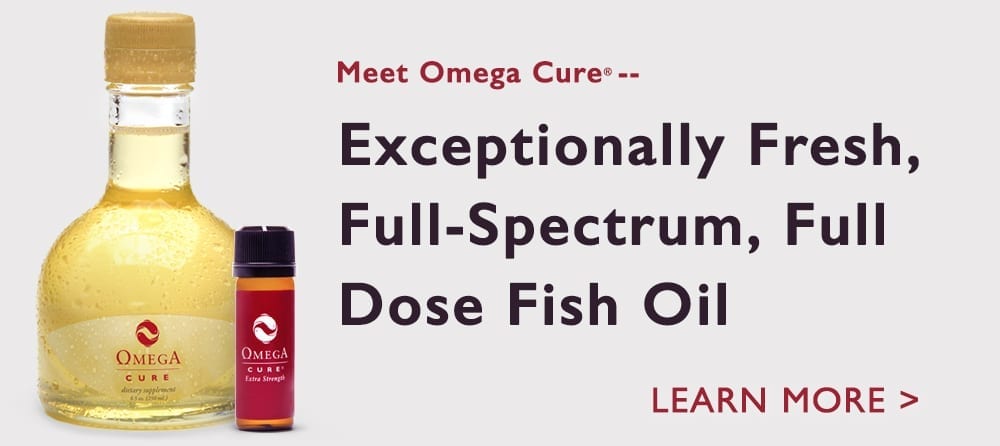Why Fish Oil Quality Matters More than Quantity
While attending medical school in Bordeaux, France, my professors insisted there was more to medicine than just writing prescriptions. We learned that food should also be an important part of treating illness, and that you needed to pay attention to how those foods were made.
I also learned about food outside of class. Being in wine country, it didn’t take long before my wife and I were invited to participate in the grape harvest at the local chateaux. The old propriétaires would proudly describe the delicate process – from the temperature, light, hand-selection of grapes, storage conditions, and serving style – and their dedication to detail made a deep impression on us.
How We Apply a “Fine Wine” Approach to Cod Liver Oil
When Anne-Marie and I started developing Omega Cure® years later, we quickly discovered that the same attention given to making a luxurious wine should be applied to cod liver oil. Just like with wine, the quality of any healthy omega-3 oil is dependent on the manufacturing process and presentation to the consumer.
When a wine “goes off”, there’s simply no way to make it good again. Similarly, you can’t restore a rancid omega-3 oil back to its fresh state. Many manufacturers try to cover the rancid taste and smell with heavy flavoring or gelatin capsules, but it’s impossible to erase the effects of the oil’s deterioration. While seemingly obvious, these lessons are still ignored by many in the omega-3 industry.
Rancid Fish Oil Is a Major Industry Issue
Because of their chemical structure, omega-3 fatty acids are more vulnerable to turning rancid (or oxidizing) than just about any other type of nutrient. Everything from how the fish were caught to how the oil was extracted influences the rate at which the oil oxidizes. By the time the finished product lands on a shelf at your local drugstore years later, the rancidity levels are often far outside recommended limits.
Sadly, multiple independent studies on omega-3 products continue to say the same thing: The majority of them are rancid at the time of purchase.
What Does It Mean for a Fish Oil to be “Fresh”?
Rancid omega-3 oils not only taste and smell bad; research also suggest that ingesting rancid fish oil supplements can be harmful.
We always recommend cracking open your current fish oil supplement and smelling the material inside. If you’re overwhelmed by a fishy smell, it’s rancid. That said, many manufacturers can mask these effects with strong flavoring, so it’s not a foolproof plan.
The best clinical way to measure a supplement’s rancidity levels is to determine its peroxide, anisidine, and TOTOX numbers. Typically, the lower the levels are, the fresher it is.
 The Secret to Making Fresh Fish Oil
The Secret to Making Fresh Fish Oil
Just like with making an award-winning wine, the key to producing an exceptionally fresh fish oil does not come down to just one factor. It starts with carefully monitoring how the fish are harvested and ends with how consumers are instructed to store and use the product.
You can read more about how we protect Omega Cure’s freshness level at every stage of production here.
Packaging Plays a Big Role in Freshness
While starting with a top-quality raw material is crucial, the packaging of an omega-3 oil also plays a major role in its nutritional value and taste.
You’ll notice that neither our Omega Cure oil nor the Omega Cure Extra Strength vials come in plastic containers or capsules. This packaging decision was made for more than aesthetic reasons.
Glass Is Better Than Plastic Packaging
While more expensive and prone to breakage, glass is by far the best material for keeping food fresh and protected over time. A study from France confirmed what wine owners have intuited for years: During storage, glass bottles helped to preserve the antioxidants and vitamins of juice significantly better than plastic bottles. The reason? Glass was better at preventing oxygen from seeping into the container, helping to preserve nutrients over time.
This same knowledge applies to fish oil. Since omega-3 fatty acids are particularly prone to oxidation, storing a high-quality cod liver oil in a plastic bottle risks compromising the nutritional integrity and freshness level of the oil over time.
We learned this lesson painfully back in 2008 when we tried to create our first single-serve Omega Cure presentation in plastic squeeze packets. The oil turned rancid in just a few weeks, and we had to throw the packets out.
That experience clarified for us the importance of using glass. And that’s why you will find Omega Cure Extra Strength and Omega Restore in glass vials today.
Omega Cure Quality: It’s All in the Details
For more than a decade, preserving (and improving upon) the freshness of Omega Cure has been our life’s work. The result is an exceptional omega-3 oil without any fishy taste or smell, and oxidation numbers that radically outperform industry standards.
Discover Why Omega3 Innovations Provides the Best Fish Oil
To learn more about how Omega Cure is made, we encourage you to read the About Our Oil page.
Recent Posts
-
Omega-3, Weight Control
Anti-Inflammatory Diet: What To Eat & To Avoid
Inflammation is a double-edged sword. It’s the body’s natural defense system, springing into action to heal injuries and fight infections. But when it goes into overdrive and becomes chronic, it...2 weeks ago -
Dose, Omega-3, Omega3 Innovations News
How to Tell if Your Omega-3 Supplement Is Working
[vc_row][vc_column][vc_column_text]Whenever we pick up a new habit to improve our health -- be it working out with weights, cutting down on refined sugar, or taking three teaspoons of Omega Cure® every...1 month ago -
Omega-3
Can Omega-3 Fish Oil Help You Lose Weight?
Over the years, I've often heard people say, "I'm not sure about taking a fish oil supplement...won't omega-3 fatty acids make me fat?” Unfortunately, the notion that all fat is...1 month ago -
Omega-3
9 Foods That Are Very High in Omega-3s
Are you looking to boost your omega-3 levels? That’s a smart move, considering that a staggering 80% of people fail to get even half the recommended daily intake of these...1 month ago -
Brain Health
Does Melatonin Help With Anxiety?
Anxiety is on the rise, no doubt about it. In 2024, 43% of adults reported feeling more anxious than they did the year prior. That's up from 37% in 2023...2 months ago -
Omega-3
What Is DPA in Fish Oil? What You Should Know
In the omega-3 fatty acid world, there are plenty of types and acronyms that come to the family party. We've got EPA and DHA, the two omegas that usually take...3 months ago


 The Secret to Making Fresh Fish Oil
The Secret to Making Fresh Fish Oil





